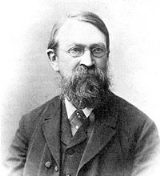
Ernst Mach
Ernst Mach was an Austrian-Czech physicist and philosopher.
Sourced
- All this, the positive and physical essence of mechanics, which makes its chief and highest interest for a student of nature, is in existing treatises completely buried and concealed beneath a mass of technical considerations.
- "The Science of Mechanics", preface to the first edition.
- I know of nothing more terrible than the poor creatures who have learned too much. Instead of the sound powerful judgement which would probably have grown up if they had learned nothing, their thoughts creep timidly and hypnotically after words, principles and formulae, constantly by the same paths. What they have acquired is a spider's web of thoughts too weak to furnish sure supports, but complicated enough to provide confusion.
- "On the Relative Educational Value of the Classics and the Mathematico-Physical Sciences in Colleges and High Schools", an address in (16 April 1886), published in Popular Scientific Lectures (1898), as translated by Thomas J. McCormack, p. 367
- Not bodies produce sensations, but element-complexes (sensation-complexes) constitute the bodies. When the physicist considers the bodies as the permanent reality, the `elements' as the transient appearance, he does not realise that all `bodies' are only mental symbols for element-complexes (sensation-complexes)
- Analyse der Empfindungen (1902) [The Analysis of Sensations], p. 23, as quoted in Lenin as Philosopher: A Critical Examination of the Philosophical Basis of Leninism (1948) by Anton Pannekoek, p. 33
- Nature consists of the elements given by the senses. Primitive man first takes out of them certain complexes of these elements that present themselves with a certain stability and are most important to him. The first and oldest words are names for "things". ... The sensations are no "symbols of things". On the contrary the "thing" is a mental symbol for a sensation-complex of relative stability. Not the things, the bodies, but colours, sounds, pressures, times (what we usually call sensations) are the true elements of the world.
- Analyse der Empfindungen (1902) [The Analysis of Sensations] p. 23, as quoted in Lenin as Philosopher: A Critical Examination of the Philosophical Basis of Leninism (1948) by Anton Pannekoek, p.. 454
Unsourced
- Explanation is nothing but condensed descriptions.
- The aim of natural science is to obtain connections among phenomena. Theories, however, are like withered leaves, which drop off after having enabled the organism of science to breathe for a time.
- The aim is not to produce bold hypotheses as to the essence of matter, or to explain the movement of a body from that of molecules, but to present equations which, free from hypotheses, are as far as possible true and quantitatively correct correspondents of the phenomenal world, careless of the essence of things and forces. In his book on mechanics, Kirchhoff will ban all metaphysical concepts, such as forces, the cause of a motion; he seeks only the equations which correspond so far as possible to observed motions.
- Substance is a convenient word for a gap in our thoughts.
- [All we have in science is] knowledge of the connexion of appearences with one another. What we represent to ourselves behind the appearances extists only in our understanding, and has for us only the value of a memoria technica or formula… But if this way of presentation is so limited and inflexible that it no longer allows us to follow the many-sidedness of phenomena [it should be discarded.]
- The mechanical theory of nature… is an artificial conception. [Or, most revealing:] Purely mechanical phenomena… are abstractions.
- Our knowledge of a natural phenomenon […] is as complete as possible when our thoughts so marshal before the eye of the mind all the relevant sense-given facts of the case that they may be regarded almost as a substitute for the phenomenon itself […] more insight than this we cannot have, and more we do not require.
- This absolute time [Newton's idea] can be measured by comparison with no motion; it has therefore neither a practical nor a scientific value; and no one is justified in saying that he knows aught about it. It is an idle metaphysical conception.
- Truth suffers herself to be courted, but evidently she has no desire to be won.
- The true inquirer seeks the truth everywhere.
- In ceasing to regard man as the centre of the universe; in discovering that the earth is a top whirled about the sun, which speeds off with it into infinite space; in finding that in the fixed stars the same elements exist as on the earth; in meeting everywhere the same processes of which the life of man is merely a vanishingly small part - in such things too is a widening of our view of the world, and edification, and poetry.
